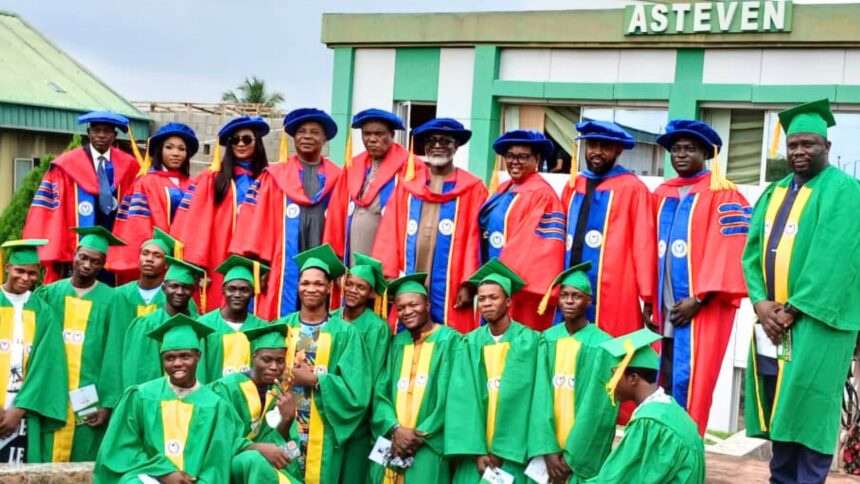… commits to nurturing skilled Nigerian workforce to lead West African renewable energy future
“Fuel subsidy removal has triggered renewable energy boom in Nigeria — Dr. Akpoyibo
Oredola Adeola
The ASTEVEN Energy Institute has matriculated 17 students into its 18-month National Diploma programme in Renewable Energy for the 2024/2025 academic session, marking its first matriculation ceremony dedicated to producing globally competitive green professionals, particularly in Solar Energy Technology.
The ceremony, held on Friday, August 8, 2025, at the institute’s main campus in Asese, Ogun State, marked a milestone for the ASTEVEN Energy Institute, the first renewable energy institution in Nigeria to offer National Diploma and professional certifications in solar technology.
Advisors Reports gathered that the pioneer students will undergo world-class training from subject specialists to equip them with the skills to power communities, create jobs, drive innovation, and lead Nigeria’s clean energy revolution.
The management stated that the students are positioned as torchbearers of a sustainable future, adding that they represent the institute’s contribution to advancing Nigeria’s renewable energy agenda and illuminating communities across the nation and beyond.
Dr. Sunny Akpoyibo, President and Chairman of ASTEVEN Energy Institute, in his address at the event, expressed pride in the institute’s achievements, noting that its global curriculum, currently used in India for their National Diploma course, has been adopted as government property both in Nigeria and other countries.
Dr. Akpoyibo explained that the vision for the institute was inspired by his years in Germany, where vocational education is prioritised as a driver of economic growth.
“When I returned to Nigeria, I committed to establishing schools that would close the wide skill gaps in the solar industry,” he said, emphasising the urgent need for an off-grid revolution to address the nation’s energy challenges.
He lamented the dominance of expatriates in executing industrial solar installations and projects funded by international agencies such as the World Bank, despite the availability of Nigerian talent.
“If Africa is to grow, we must develop local skills and capacity in the renewable energy sector. Most Nigerians are not taught how to design bankable solar projects because of the lack of professional institutions,” he said.
Dr. Akpoyibo revealed that he had committed billions of naira into building Nigeria’s first renewable energy training institute, funds that could have gone into more profitable ventures like hotels, driven by a passion to create impact and ensure sustainability in the sector.
He said, “The institute, approved by the Nigerian Government and the National Board for Technical Education (NBTE) two years ago, offers training to equip young people with the skills required for the renewable energy workforce.
Dr. Akpoyibo also pointed out that billions of dollars in energy funds, such as $500 million for underserved communities and $750 million for solar projects, are coming into Nigeria but remain largely executed by foreign professionals.
“We need highly qualified local installers to handle these projects and ensure bankable solar solutions that can attract clean energy financing from commercial banks,” he stressed.
He therefore urged the pioneer students to remain focused, disciplined, and relentless in their pursuit of excellence, stressing that their journey was “bigger than a certificate,” as they were setting a standard and creating a legacy as the first cohort to undertake the National Diploma in Solar Technology in Nigeria.
He added that many of the pioneer students are on scholarships and that the institute operates entirely on solar power, having never been connected to the national grid.
He further explained that the institute has, since its inception, trained over 3,000 people through short courses in solar technologies.
“With the removal of fuel subsidies, the renewable energy industry boom is here in Nigeria,” he said, noting that solar energy could bridge the country’s energy and grid deficiencies.
The Chairman ASTEVEN INSTITUTE emphasised that the institution is shaping a conversation that envisions over 200 million Nigerians having access to solar systems, reducing business costs, preventing grid collapse, and unlocking economic growth through energy access.
Dr. Segun Adaju, Former President of the Renewable Energy Association of Nigeria and Director of Programmes at ASTEVEN Institute, in his submission, identified the shortage of qualified and certified solar panel installers as one of the greatest challenges in Nigeria’s renewable energy sector.
He lamented that, despite the country’s high unemployment rate, large-scale solar projects often rely on expatriates, a practice he described as unacceptable.
“We must train and equip our people to take over these jobs, and that is exactly what we are doing at ASTEVEN, preparing them to work anywhere in the world,” he said, stressing that solar energy remains a key component of Nigeria’s energy mix and critical to bridging the country’s electricity deficit.
Dr. Adaju expressed confidence that Nigeria can achieve its 2030 target of generating 30% of its electricity from renewable sources and meet its 2060 net-zero commitment, provided the Federal Government implements the right policies.
He noted that Nigeria, as Africa’s most populous nation, has the human capital to become a regional leader in solar power if that capacity is fully developed.
Commending the management of ASTEVEN institute for its vision to ensure the renewable energy sector never lacks skilled manpower, Adaju urged the pioneer students to take their training seriously, adding that certified solar professionals are in high demand globally, including in Canada, the United States, and the United Kingdom.
“One of the greatest needs worldwide is for skilled artisans,” he said, assuring the students that opportunities await them after graduation.
Dr. Adaju revealed that his own company currently requires over 17 professional installers and that the institute’s certification is recognised internationally, opening doors for graduates to work both within Nigeria and abroad.




